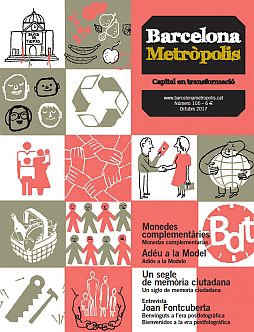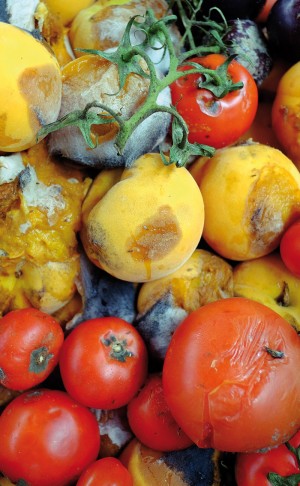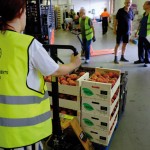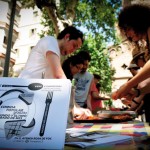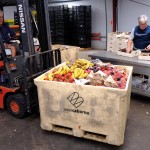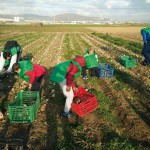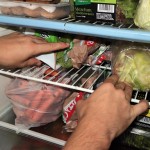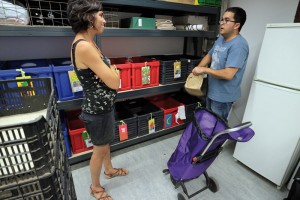In Catalonia, 7% of all food purchased by families, restaurants and shops each year is wasted. Food waste is a global problem which can be fought by means of better laws and social projects, in addition to individual and household initiatives.
Many of us were taught at home from an early age not to waste food. In previous times we had neither the means nor the technology available today to buy, preserve and cook food. Even so, families took measures to preserve food, and recipes were designed to make the most of available ingredients. Our society’s accelerated pace of life has seen many of these good habits fall by the wayside.
A UN Food and Agriculture Organisation study has estimated average yearly household food waste in Europe at around 95 kg per person. The study concluded that 33% of the food produced worldwide for human consumption is lost or wasted at some point along the food chain.
Juan Marcos de Miquel, founder of the Nevera Solidaria (Solidarity Fridge) initiative, holds that food that is no longer usable for human consumption should be reused to make animal feed or fertiliser, and that converting it to waste should only be a last resort. “We see food as merchandise: this is the root cause of waste. We buy more than we need. We do not engage in food planning. We look for offers that enable us to buy more and to have more of it around just in case”. Miquel, who is also head of the Vallès Occidental Oest Public Health Service, illustrates this situation with an example: “When I was little, we had bread and chocolate for tea. Nowadays we stock up our pantries with unlimited supplies of food without worrying about its expiry date”.
The process of food production, storage and transport leaves a considerable ecological footprint. When we waste food, we also waste the resources (soil, water, energy) used to produce it, and we indirectly contribute to higher carbon dioxide emissions.
In Catalonia, 262,000 tonnes of food are wasted annually, 7% of the total bought by families, restaurants and shops, according to the study Diagnosi del malbaratament alimentari a Catalunya (Diagnosis of Food Waste in Catalonia) conducted by the Autonomous University of Barcelona (UAB) in 2010 for the Catalan Waste Agency. This figure means that Catalans waste an average of about 35 kilos per person each year, equivalent to one person’s consumption over 25 days. The total volume of wasted food could feed more than a half a million people for a year.
The average Barcelona resident consumes 550 kg of food per year at a cost of €1,560 per person. The annual loss due to waste is €112 per inhabitant, or €841 million for all of Catalonia. The largest percentage of waste (58% of the total volume) is generated in households, followed by supermarkets (16%), the hotel industry (12%), the retail trade (9%), catering (4%) and municipal markets (1%).
Juan Marcos de Miquel explains that the problem with Spanish regulations is that they lack both precision and measures requiring the food sector to lower waste rates. “Spanish law leaves the decision of whether to stop selling processed foods that may be hazardous to consumers up to producers and manufacturers. And, of course, fear and a lack of information results in some foods being rejected outright without first determining whether they are a health hazard. At the end of the day, the barriers are fear and a lack of solidarity”.
THE SOCIAL FACTOR
In Barcelona, numerous initiatives to reduce food waste are underfoot. Paco Muñoz, Vice President Plataforma Aprofitem els Aliments, or PAA, for the good use of food, says that the most important event for this initiative is “The Great Dinner”, organised once a year by different organisations throughout Catalonia and the rest of Spain. There is also the “Barcelona shares food” programme organised by the non-profit Nutrition without Borders, through which hotels and restaurants give surplus food away to social organisations. However, Muñoz adds that “most of these initiatives depend on civil society. What we need are specific bylaws and a procurement requirement for all of the city’s food service providers to fight waste”.
So as we can see, initiatives are not in short supply. What is still lacking is information and training opportunities for the public, solidarity and courage on the part of food producers, and a broad-based social consciousness which acknowledges that the problem is not something caused by a few wasteful individuals, but a worldwide issue affecting the entire planet.
The Food Bank, a preventative measure The Barcelona Food Bank helps to channel surplus food generated at different points in the food chain, and it also promotes collection campaigns. In the words of former Vice Chairman Jordi Peix i Massip, the organisation “was founded with the mission of collecting consumable but unmarketable food products and distributing them to social organisations that will get them into the hands of needy people”. The collected food comes from agri-food businesses (surplus and non-surplus), collection initiatives and one-off donations.
Feeding social awareness PAA works as a network to bring together all the participants in the food chain and come up with shared solutions to the problem of food waste. Its lines of action include organising festive and popular public awareness events, mediation and advisory initiatives and supporting specific legislation. “Everyone who attends our dinners becomes aware of what they have to change at home – as both a consumer and as a citizen – to help transform the rules that govern the way we are fed and what we eat. Everyone comes out knowing that they are part of the solution”, said Paco Muñoz, the organisation’s vice president.
The responsibility of Mercabarna Every year, two million tonnes of food are commercialised through the Mercabarna wholesale markets. According to a study by the UAB, nine million kilos (0.5%) of these products will be wasted. Josep Tejedo, CEO of Mercabarna, explains that in order to lower this figure the organisation decided to optimise the Central Fruit and Vegetable Market’s waste management process and thus initiated a collaborative relationship with the Food Bank for which the use of 425 m2 of warehouse space has been granted.
Imperfect foods are edible “We live in a world where we are pressured to be perfect, but neither people nor food are,” says Mireia Barba, founder of Espigoladors, an organisation that collects surplus food from production processes and ensures that 95% of it reaches social organisations. The objective is to fight food waste and empower people at risk of social exclusion. To accomplish this, they use the brand Es Im-perfect, the first in Spain to sell high-quality food products originating from fruit and vegetable surpluses and which – thanks to their low price – help people in financial straits obtain good nutrition.
Solidarity via the fridge Nevera Solidaria encourages people to leave leftover food in special fridges (fifteen throughout Spain) so that those who need it can get it before it goes off. In the words of the initiative’s founder Juan Marcos de Miquel, these fridges “are symbols that should inspire reflection. Once a community-owned fridge has been installed, its presence should be publicised in order to spark the creation of other public awareness-raising projects”.
Supermarkets with initiative In 2015 the Danish organisation DanChurchAid created the first supermarket in the world that only sold food and non-food products that had minor flaws or that were about to expire at half price: Wefood. At the European level, the non-profit The Real Junk Food Charitable Foundation was a driving force behind the first UK supermarket to sell food that is past its best before date. When the organisation’s volunteers receive foodstuff that food banks, restaurants, cafés or events have rejected, they inspect it by sight, smell and taste to determine whether it is suitable for human consumption. In this way, they can prevent tonnes of food from being wasted without any type of control.
STRATEGIES TO PREVENT FOOD WASTE
More than half the total volume of food waste in Catalonia originates in households. Small everyday actions such as modifying certain habits and optimising purchase planning would generate substantial and positive across-the-board effects.
To reduce waste, the most accessible, responsible and simple initiative starts in the shopping baskets and kitchens of each citizen. We could start, for example, by better organising our shopping habits. One of the main causes of food waste is a lack of planning, which translates into the purchase of food that we end up not eating. Making a shopping list, planning the week’s meals in advance and cooking the correct portions will save money and cut down on waste.
Pay attention to labels! Knowing the information they provide helps consumers act accordingly and use their common sense. The use by date states the time from which the consumption of food may pose a health risk. The best before date, however, states the time from which it cannot be ensured that all of a product’s organoleptic properties (flavour, smell, texture, etc.) will be maintained, even though it can still be consumed without any risk to health.
Organic consumers’ groups An alternative solution that is now gaining popularity is that of organic consumers’ groups. This is a form of consumption based on having a direct relationship with producers, enabling the purchase of local, seasonal, fresh and organic products. The groups generally operate as cooperatives where work is distributed amongst families, Specific tasks include contacting suppliers, preparing food baskets, collecting from each family on a particular day each week, stock control, etc. This consumption model is practised by more than one hundred groups throughout Catalonia, of which 82% are in the city of Barcelona and its surrounding areas.



